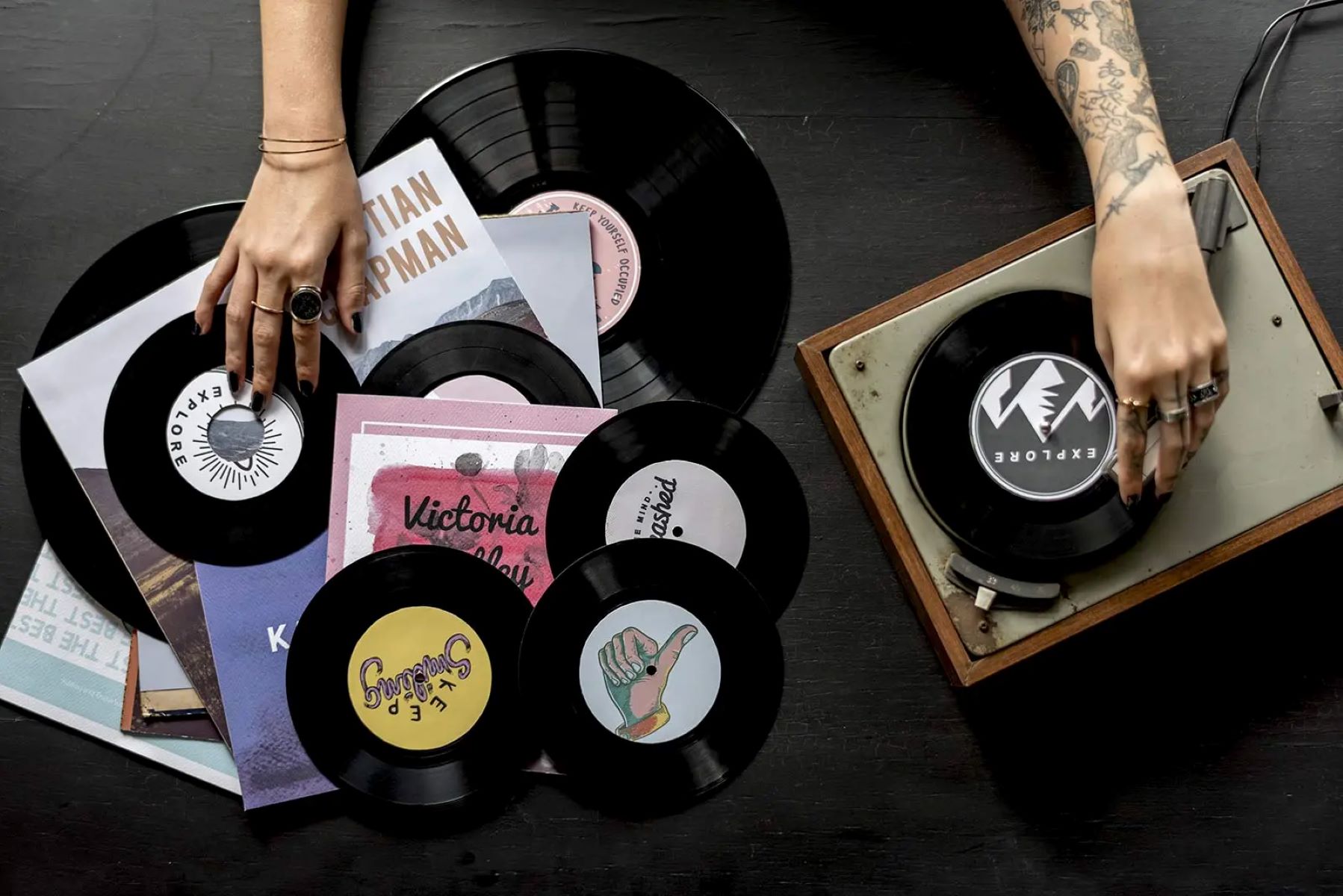Home>Production & Technology>Songwriter>How To Pitch Music To Record Label: Songwriter


Songwriter
How To Pitch Music To Record Label: Songwriter
Modified: February 26, 2024
Learn how to pitch your music to record labels as a songwriter. Discover the best strategies to get your songs noticed and signed. Perfect for aspiring songwriters looking to break into the music industry.
(Many of the links in this article redirect to a specific reviewed product. Your purchase of these products through affiliate links helps to generate commission for AudioLover.com, at no extra cost. Learn more)
Table of Contents
Introduction
As a songwriter, the dream of having your music heard and appreciated by a wide audience is a powerful motivator. However, breaking into the music industry and getting your songs noticed by the right people can be a daunting challenge. One of the most effective ways to gain exposure and advance your career as a songwriter is by pitching your music to record labels.
Pitching your music to record labels is a crucial step in the journey of a songwriter. It involves presenting your work to industry professionals who have the power to help you reach a larger audience and achieve success in the music industry. This process requires careful planning, strategic thinking, and a deep understanding of the dynamics of the music business.
In this comprehensive guide, we will delve into the intricacies of pitching music to record labels as a songwriter. From understanding the role of record labels to crafting a compelling demo and making the perfect pitch, we will explore the essential steps and strategies to help you navigate this pivotal phase of your music career.
Whether you are a seasoned songwriter looking to take your career to the next level or an aspiring artist eager to make your mark in the industry, mastering the art of pitching music to record labels is a crucial skill. By the end of this guide, you will have gained valuable insights and practical tips to enhance your approach and increase your chances of capturing the attention of record label executives.
Now, let's embark on this enlightening journey and unlock the secrets of effectively pitching your music to record labels. It's time to elevate your songwriting career and make a lasting impression in the vibrant world of music industry.
Understanding the Record Label
Record labels play a pivotal role in the music industry, serving as the gatekeepers to widespread exposure, distribution, and financial support for artists and songwriters. Understanding the functions and significance of record labels is essential for songwriters aiming to pitch their music effectively.
The Role of Record Labels
Record labels act as the bridge between songwriters and the broader music market. They provide a range of services, including artist development, marketing, promotion, distribution, and financial backing. By signing with a record label, songwriters gain access to a network of industry professionals who can help refine their sound, promote their music, and secure lucrative opportunities.
Artist Development
One of the key functions of record labels is artist development. This involves nurturing the talent of songwriters and guiding them through the process of honing their craft, refining their sound, and preparing for the demands of the music industry. Record labels often provide resources such as studio time, access to experienced producers, and opportunities for collaboration to help songwriters reach their full potential.
Marketing and Promotion
Record labels leverage their expertise and resources to market and promote the music of their signed artists. This includes creating strategic marketing campaigns, securing media coverage, organizing live performances, and maximizing exposure across various platforms. Through targeted promotional efforts, record labels aim to elevate the visibility of songwriters and their music, ultimately driving sales and expanding their fan base.
Distribution and Financial Support
Another critical function of record labels is the distribution and financial support they offer to songwriters. By leveraging their established distribution networks, record labels facilitate the widespread availability of music across physical and digital platforms. Additionally, they provide financial backing for music production, marketing initiatives, and touring expenses, enabling songwriters to focus on their creative endeavors while the label handles the business aspects.
Industry Relationships
Record labels have extensive connections within the music industry, including radio stations, streaming platforms, concert promoters, and media outlets. These relationships are invaluable for songwriters seeking to gain exposure and build a sustainable career in music. By partnering with a reputable record label, songwriters can tap into these industry connections and access opportunities that may otherwise be out of reach.
In essence, record labels serve as strategic partners for songwriters, offering a range of resources and expertise to propel their careers forward. Understanding the pivotal role of record labels is crucial for songwriters preparing to pitch their music, as it provides insight into the potential benefits of securing a partnership with a reputable label.
Preparing Your Pitch
Preparing your pitch to a record label is a meticulous process that demands careful planning and attention to detail. A well-crafted pitch can significantly enhance your chances of capturing the interest of record label executives and making a lasting impression. Here are the essential steps to prepare a compelling pitch for your music:
-
Know Your Audience: Before crafting your pitch, conduct thorough research on the record label you intend to approach. Familiarize yourself with the label's roster of artists, musical genres they specialize in, and their overall brand identity. Understanding the label's preferences and areas of focus will enable you to tailor your pitch to align with their interests.
-
Refine Your Unique Selling Proposition: Identify the unique elements that set your music apart and make it compelling to potential listeners. Whether it's your distinctive songwriting style, powerful storytelling, or innovative musical arrangements, highlighting your unique selling proposition in your pitch can pique the interest of record label representatives.
-
Create a Professional Press Kit: Compile a professional press kit that includes a concise artist bio, high-quality promotional photos, press clippings or reviews, and any notable achievements or accolades. Your press kit serves as a visual and informational representation of your music and artistic identity, making it an invaluable tool for conveying your story to record label professionals.
-
Craft a Captivating Elevator Pitch: Develop a succinct and captivating elevator pitch that encapsulates the essence of your music and artistic vision. An effective elevator pitch should convey your musical style, influences, and the emotional impact of your songs in a concise and compelling manner. This brief introduction can serve as a powerful tool to engage record label executives and spark their interest.
-
Prepare a Detailed Business Plan: In addition to showcasing your artistic talent, it's essential to present a clear and realistic business plan that outlines your goals, target audience, marketing strategies, and revenue projections. Demonstrating a strategic approach to your music career can instill confidence in record label professionals regarding your readiness for a partnership.
-
Gather Testimonials and Endorsements: If you have received positive feedback from industry professionals, fellow musicians, or fans, incorporating testimonials and endorsements into your pitch can add credibility and reinforce the quality of your music. Genuine endorsements can validate your talent and strengthen the appeal of your pitch.
By diligently preparing your pitch with these strategic elements, you can present your music to record labels in a compelling and professional manner, increasing the likelihood of capturing their attention and initiating meaningful conversations about potential collaborations. Remember, a well-prepared pitch reflects your dedication and professionalism as a songwriter, setting the stage for fruitful interactions with record label representatives.
Crafting a Compelling Demo
Crafting a compelling demo is a pivotal aspect of pitching your music to record labels as a songwriter. A demo serves as a tangible representation of your musical prowess and creative vision, offering record label executives a glimpse into the sonic world you have meticulously crafted. Here are the key elements to consider when creating a demo that resonates with record label professionals:
Showcase Your Best Work
Your demo should feature a carefully curated selection of your best songs that exemplify your artistry and potential for commercial success. Choose tracks that showcase your versatility, songwriting prowess, and ability to captivate listeners across different musical styles. By presenting a diverse yet cohesive body of work, you can demonstrate the depth and breadth of your musical talent.
Professional Production Quality
The production quality of your demo is paramount in leaving a lasting impression on record label representatives. Invest in professional recording, mixing, and mastering to ensure that your music sounds polished and sonically compelling. A well-produced demo not only elevates the listening experience but also conveys your commitment to delivering high-quality music.
Engage the Listener from the Start
The opening moments of each song in your demo should immediately captivate the listener and draw them into the sonic narrative. Whether it's a mesmerizing melody, evocative lyrics, or a striking instrumental arrangement, the initial impact of your music sets the tone for the entire listening experience. Engaging the listener from the outset increases the likelihood of making a memorable impression.
Emphasize Songwriting Brilliance
As a songwriter, the strength of your compositions is a defining factor in the appeal of your demo. Choose songs that showcase your exceptional songwriting skills, whether through poignant storytelling, emotive melodies, or thought-provoking lyrical content. Highlighting your prowess as a wordsmith and melody crafter can resonate deeply with record label professionals seeking authentic and compelling songwriting.
Reflect Your Artistic Identity
Your demo should authentically reflect your artistic identity and musical vision. Whether you lean towards introspective ballads, infectious pop anthems, or genre-defying experimentation, your demo should encapsulate the essence of who you are as a songwriter. Consistency in portraying your unique musical identity can help record label executives envision the potential for long-term artist-label partnerships.
Crafting a compelling demo demands meticulous attention to detail, artistic integrity, and a relentless pursuit of excellence. By infusing your demo with the essence of your musical artistry, you can create a powerful sonic calling card that resonates with record label professionals and amplifies the impact of your pitch. As you prepare your demo, remember that it serves as a gateway for record label executives to immerse themselves in your musical world, making it a potent tool for capturing their attention and igniting interest in your artistry.
Finding the Right Contact
Identifying and connecting with the right contacts within record labels is a critical step in the process of pitching your music as a songwriter. This strategic approach can significantly enhance the effectiveness of your pitch and increase the likelihood of your music reaching the ears of decision-makers. Here's how you can navigate the intricate landscape of finding the right contacts within record labels:
Research Record Label Personnel
Begin by conducting thorough research on the record label of interest. Explore their official website, social media profiles, and press releases to identify key personnel, including A&R (Artist and Repertoire) representatives, label executives, and department heads. Understanding the organizational structure and the roles of individuals within the label can provide valuable insights into the decision-making hierarchy.
Utilize Industry Directories and Databases
Industry directories and databases, such as the Music Business Registry and AllMusic, offer comprehensive listings of record labels, including contact information for key personnel. These resources serve as valuable tools for identifying the specific individuals responsible for reviewing music submissions and signing new talent. Leveraging industry directories can streamline the process of pinpointing the right contacts within record labels.
Network within the Music Industry
Networking within the music industry can open doors to valuable connections and insider knowledge. Attend industry events, music conferences, and showcases where record label representatives are likely to be present. Engage in meaningful conversations, build relationships with industry professionals, and seek opportunities to connect with individuals who may facilitate introductions to the right contacts within record labels.
Engage with Artists Signed to the Label
Reach out to artists who are currently signed to the record label you are targeting. Establishing connections with fellow artists can provide insights into the label's internal dynamics and help you gain a better understanding of the individuals who play pivotal roles in signing new talent. Additionally, artists signed to the label may offer guidance on the most effective channels for reaching out to the right contacts.
Leverage Professional Associations and Organizations
Professional associations and organizations within the music industry, such as the Recording Academy and the Songwriters Hall of Fame, can serve as valuable resources for connecting with industry insiders. Participate in industry events hosted by these organizations, engage in collaborative projects, and leverage the collective expertise and networks of industry professionals to identify and connect with the right contacts within record labels.
By employing these strategic approaches, you can effectively identify and connect with the right contacts within record labels, positioning yourself for meaningful interactions and opportunities to present your music in a compelling manner. Navigating the intricate landscape of the music industry with a proactive and strategic mindset can amplify the impact of your pitch and pave the way for potential collaborations with record label professionals.
Making the Pitch
Making the pitch to a record label is a pivotal moment that demands a strategic and compelling approach. As a songwriter, conveying the essence of your music and artistic vision in a captivating manner can significantly influence the receptiveness of record label executives. Here are the essential elements and best practices for making a compelling pitch that resonates with record labels:
Craft a Persuasive Pitch Deck: Develop a visually engaging pitch deck that showcases your artistic journey, musical achievements, and the unique value you bring as a songwriter. Include impactful visuals, such as performance photos, album artwork, and compelling graphics that complement the narrative of your pitch. A well-designed pitch deck can effectively capture the attention of record label professionals and immerse them in your creative world.
Articulate Your Musical Identity: During the pitch, articulate a clear and compelling narrative that defines your musical identity, influences, and the emotional resonance of your songs. Communicate the stories behind your compositions, the thematic elements that drive your creative process, and the authentic connection you seek to establish with listeners. By articulating your musical identity with passion and authenticity, you can convey the depth of your artistry to record label executives.
Highlight Your Track Record: Showcase your track record as a songwriter, including notable achievements, collaborations, and any industry recognition or accolades you have garnered. Whether it's successful performances at renowned venues, chart placements, or influential partnerships, emphasizing your track record can instill confidence in record label professionals regarding your potential for long-term success in the music industry.
Present a Strategic Marketing Plan: Outline a strategic marketing plan that demonstrates your vision for promoting your music and expanding your fan base. Detail your proposed marketing initiatives, social media strategies, and innovative approaches to engaging with audiences. A well-crafted marketing plan showcases your proactive mindset and business acumen, positioning you as a songwriter who is prepared to actively contribute to the success of your music.
Deliver a Captivating Performance: If given the opportunity to perform live as part of your pitch, deliver a captivating and memorable performance that showcases your stage presence, vocal prowess, and ability to connect with an audience. A compelling live performance can leave a lasting impression on record label executives, providing a visceral experience that complements the auditory presentation of your music.
By integrating these key elements into your pitch, you can create a compelling and immersive presentation that resonates with record label professionals and positions your music for serious consideration. Making the pitch is an opportunity to convey your passion, talent, and readiness for a fruitful partnership with a record label, setting the stage for potential collaborations that can elevate your career as a songwriter.
Following Up
Following up after making your initial pitch to a record label is a crucial step in maintaining momentum and nurturing the relationship. It demonstrates your professionalism, persistence, and genuine interest in establishing a meaningful partnership. Here are the key strategies for effectively following up with record label executives after making your pitch:
Express Gratitude and Enthusiasm
Begin by expressing sincere gratitude for the opportunity to present your music and engage with the record label. A personalized thank-you message, whether through email, handwritten note, or a brief phone call, can leave a positive impression and convey your enthusiasm for the potential collaboration. Expressing gratitude reinforces your appreciation for the time and consideration extended by the record label representatives.
Seek Feedback and Clarifications
In your follow-up communication, express your eagerness to receive feedback on your pitch and inquire about any additional information or materials the record label may require. Seeking clarifications on the next steps or any specific aspects of your music that piqued their interest demonstrates your openness to constructive input and your commitment to addressing the label's needs.
Provide Updates on Milestones
If you have achieved significant milestones or noteworthy developments related to your music career since the initial pitch, such as successful performances, new releases, or positive media coverage, share these updates with the record label. Keeping them informed about your progress demonstrates your proactive approach and reinforces the momentum behind your artistic endeavors.
Maintain Consistent Communication
Establish a cadence of consistent communication while respecting the professional boundaries and timelines set by the record label. Regular updates, such as new song releases, upcoming performances, or creative projects, can serve as touchpoints to keep the label informed about your ongoing musical journey. However, it is essential to strike a balance and avoid overwhelming the recipients with excessive communication.
Request a Follow-Up Meeting or Discussion
If the initial pitch has generated interest from the record label, consider requesting a follow-up meeting or discussion to delve deeper into potential collaboration opportunities. This proactive approach demonstrates your commitment to exploring mutually beneficial partnerships and allows for a more in-depth exchange of ideas and expectations.
Remain Patient and Persistent
While maintaining consistent communication, it is important to remain patient and respectful of the time required for the record label to evaluate your pitch and make informed decisions. Persistence, coupled with patience, can convey your dedication to building a lasting relationship while allowing the label the necessary space to consider your music within their broader strategic initiatives.
By implementing these follow-up strategies, you can reinforce the impact of your initial pitch and cultivate a positive and enduring rapport with record label executives. Effective follow-up communication reflects your professionalism, proactive mindset, and genuine desire to forge meaningful connections within the music industry.
Conclusion
In the dynamic and ever-evolving landscape of the music industry, pitching your music to record labels as a songwriter represents a pivotal juncture in your artistic journey. Throughout this comprehensive guide, we have navigated the intricate nuances of preparing, crafting, and delivering a compelling pitch to record label executives. As you embark on this transformative endeavor, it is essential to recognize the profound impact of effectively pitching your music to record labels.
By mastering the art of pitching, you position yourself as a proactive and strategic songwriter ready to seize opportunities and forge meaningful partnerships within the music industry. The process of preparing your pitch involves meticulous attention to detail, strategic planning, and a deep understanding of the dynamics of record labels. From refining your unique selling proposition to crafting a captivating demo and identifying the right contacts, each step contributes to the holistic approach of presenting your music with authenticity and professionalism.
Crafting a compelling demo emerges as a powerful tool for conveying the essence of your musical artistry, captivating the attention of record label professionals, and igniting interest in your creative vision. Through the artful selection of songs, professional production quality, and a genuine reflection of your artistic identity, your demo serves as a sonic calling card that resonates with industry decision-makers.
The culmination of these efforts is manifested in the art of making the pitch—a transformative moment where you articulate your passion, talent, and readiness for a fruitful partnership with a record label. By delivering a persuasive pitch deck, articulating your musical identity, and presenting a strategic marketing plan, you create a compelling narrative that resonates with record label executives and positions your music for serious consideration.
Following up after the pitch reinforces your dedication, professionalism, and genuine interest in nurturing relationships within the music industry. It serves as a testament to your persistence and proactive mindset, laying the groundwork for meaningful interactions and potential collaborations that can elevate your career as a songwriter.
In conclusion, the journey of pitching your music to record labels is a testament to your unwavering dedication, creative vision, and readiness to embrace the boundless opportunities that the music industry offers. By embracing the strategic insights and best practices outlined in this guide, you are poised to navigate this transformative phase with confidence, resilience, and an unwavering commitment to realizing your musical aspirations. As you embark on this transformative endeavor, remember that your voice as a songwriter holds the power to resonate with the world, and the art of pitching is the gateway to amplifying its impact.











